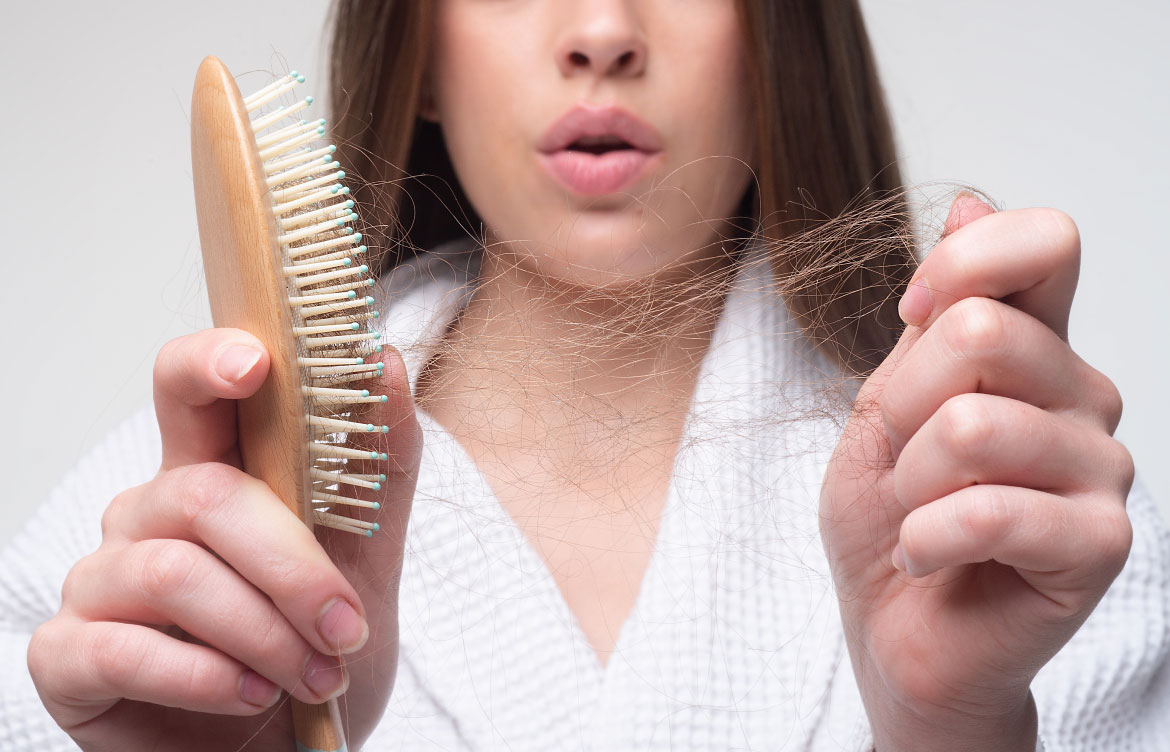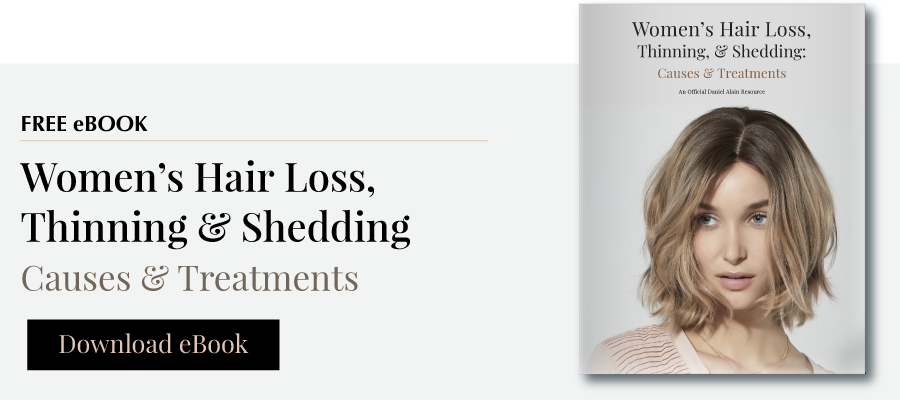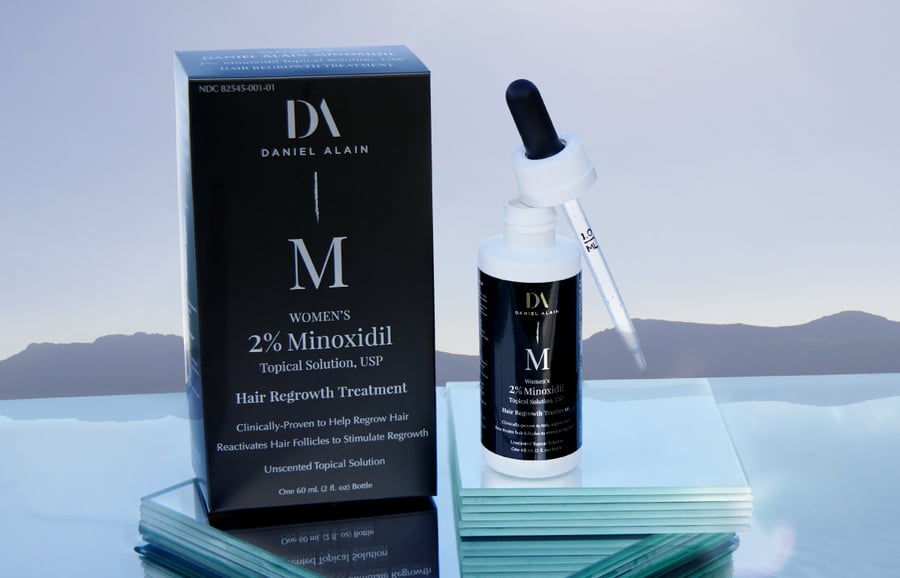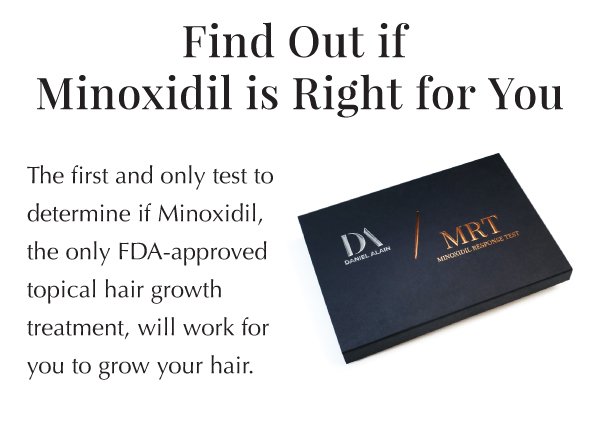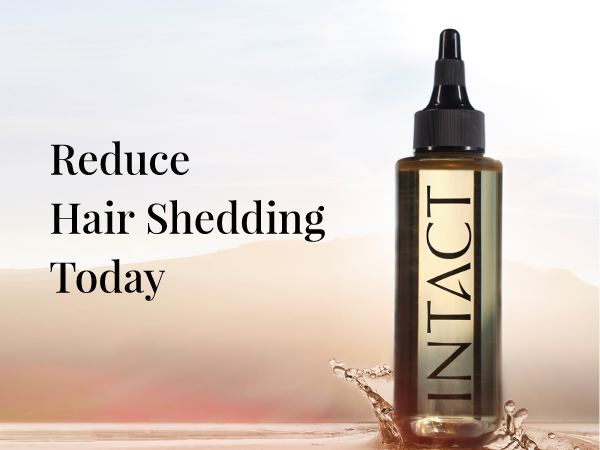In an ideal world, our hair would look as lush and healthy as we age as it did in our younger years. But unfortunately, millions of men and women start finding bald patches and strands thinner than silk much sooner. That's because age isn't the only factor that causes hair loss—genetics, hormones, nutrient deficiencies, lifestyle habits, and even stress can all play a part.
While some types of hair loss are out of our control, there are steps we can take to prevent the progression of hair thinning and keep our locks looking strong and vibrant for as long as possible. In this post, we'll share the best tips to prevent hair loss (even when it's genetic) and keep your strands healthy for years to come.
WHAT HELPS PREVENT HAIR LOSS?
If you're worried about waking up one morning to find that your hairline has gone AWOL, don't fret—preventing hair loss is possible. While the following tips won't help you regrow your strands once they're gone, they will go a long way in preventing hair loss from occurring in the first place.
Whether you're looking to keep your parents' balding genes at bay or minimize any potential mane damage caused by stress, read on for the best hair loss prevention tips that actually work.
INTACT Anti Hair Shedding Treatment
The best way to prevent hair loss? Stop it before it starts by keeping your strands where they belong: on your head.
INTACT is a pre-shampoo treatment that grips onto each individual strand to fortify it from root to tip, making it strong enough to withstand the everyday activities that lead to hair shedding (think brushing, styling, and washing). Trust us, adding this powerhouse formula to your hair care routine is a total game-changer.

Clinically Proven
Everyone loses an average of 50 to 100 strands a day. With INTACT, you can retain more hair and reduce shedding by up to 77%—now that's something worth bragging about.
Works in 30 Minutes
INTACT works quickly and efficiently to help fortify your strands against damage, so you can get on with your day. Just apply it a half hour before your shower, let it do its magic, then shampoo and condition it as usual. You'll be amazed at the difference it makes.
Volumizes Hair
As it turns out, strong strands are volumized strands. INTACT strengthens the tiny muscles that make up the base of each hair follicle. And when those muscles tighten, your mane is simultaneously lifted for a fuller, thicker appearance. Preventing hair loss and getting voluminous strands? We'll take it.
Nourishes & Hydrates the Scalp
A healthy scalp is the foundation for strong, healthy strands—and INTACT gives your noggin all the TLC it needs to reach its full potential. The treatment is packed with soothing plant-based nutrients like GMO-free corn sugar, panthenol (B5), and coconut fatty acids to fortify, hydrate, and nourish your scalp.
Contains Ingredients You Can Trust
We only use ingredients that are clinically proven to work—and we're always transparent about what they are and what they do. You won't find any fillers, fluff, or harmful chemicals in our products. Just results you can see and feel.
Delivers the Impressive Results in Just One Use
INTACT is so powerful you'll notice less hair in your shower drain after just one use. And when you use it consistently, you can expect to see even more dramatic results over time. Click here to grab a bottle of INTACT and see for yourself why it's easily the best way to prevent hair loss.
Avoid Tight Hairstyles
If you're wondering how to prevent hair loss, you might want to look at your go-to hairstyles. While tight ponytails, buns, and braids might look good, they can actually do a number on your strands—especially if you wear them often.
When you pull your hair back too tightly, it puts unnecessary strain on your follicles which can lead to breakage and, over time, a certain type of hair loss called traction alopecia. If you love wearing your hair up, opt for loose styles like low buns and ponytails, or try using fabric-covered hair ties to minimize any potential damage.
Don't Chemically Treat Your Hair
If you're a fan of coloring, highlighting, or otherwise chemically treating your strands, it's important to do so sparingly. Overdoing it can lead to damage that makes your hair more susceptible to breakage and, as a result, hair loss.
When you do hit up the salon, be sure to use products that are specifically designed for color-treated hair. These formulas will help to minimize any potential damage and keep your strands healthy and strong.
Limit High-Heat Styling Tools
We get it, you love your straightener and can't imagine going a day without your signature blowout. But overdoing it on the heat styling can create some serious wreckage to your mane.
When you use heated styling tools too often, they can damage the proteins in your strands, making them weak and susceptible to breakage. If you're looking to prevent hair loss, cutting back on high-heat styling is a good place to start.
Use a Soft Brush Made with Natural Fibers
One of the best ways to prevent hair loss is to brush your strands with a soft, natural-bristle brush—preferably one made with boar bristles. When you tug at your tresses with a harsh brush, you can damage the cuticle, which leads to breakage and shedding.
A soft brush (like our collection from Daniel Alain) will help to gently detangle your hair without putting any unnecessary strain on your follicles. And when you're brushing, be sure to start from the bottom and work your way up to avoid any tugging or pulling.
Eat a Balanced Diet
You are what you eat—and that goes for your hair, too. If you're not eating a balanced diet with plenty of protein, healthy fats, and vitamins and minerals, it can show up in the form of lackluster strands that are more prone to breakage. So fill up your plate with hair-loving foods like leafy greens, fatty fish, and whole grains to give your mane the nourishment it needs.
Take Vitamins & Supplements
In addition to eating a nutrient-rich diet, you can also give your hair a boost from the inside out by taking vitamins and supplements. Products like biotin, iron, and omega-3 supplements have all been shown to promote healthy hair growth. Just remember that in order for any supplements to work, you actually have to be deficient in them—so be sure to take a blood test before popping any pills.
Quit Smoking
If you're a smoker, it's time to get serious about quitting—for the sake of your hair and your health. Smoking can have a major impact on circulation, which means less oxygen and nutrients are making their way to your follicles. As a result, your strands are more likely to become weak and break off. So do yourself (and your hair) a favor and make an effort to kick the smoking. We know it’s not an overnight solution, but if you can cut back and eventually quit, you’ll give your follicles a fighting chance to limit hair loss.
Minimize Stress
We know, it's easier said than done. But reducing stress in your life can actually help to prevent hair loss. When you're feeling stressed, your body goes into fight-or-flight mode and starts pumping out the hormone cortisol.
Too much cortisol can lead to a condition called telogen effluvium, during which your hair follicles go into a resting phase, and your strands fall out as a result. If you're looking to keep your hair healthy and prevent shedding, address the major causes of stress in your life and find ways to relax on a daily basis.
HOW DO YOU TREAT YOUR HAIR LOSS?
While sometimes finding the root cause of hair loss can be as simple as pointing to a stressful event or a lack of healthy fats on your plate, for others, the reason behind their shedding is a bit more complicated. If you've tried making lifestyle changes and taking supplements but aren't seeing any results, it's possible that your hair loss is genetic.
And although you can't necessarily change your genes, there are ways to treat genetic hair loss effectively, along with tests you can take to determine if you're predisposed to the condition.
Minoxidil
When you think of hair loss treatments, the first thing you probably think of is the bottle of Rogaine in your dad's medicine cabinet. But Minoxidil, the active ingredient in Rogaine® (and its generic equivalents), isn't just for men.
Minoxidil is one of the only FDA-approved treatments for both men and women with genetic hair loss, and it's available over the counter. And while it won't necessarily reverse hair loss, it can help to stimulate new growth and prevent further shedding—but only if you have the enzyme activity that converts Minoxidil to its active form. To find out if you do, you can take our Minoxidil Response Test.
Finasteride
If you're not a good candidate for Minoxidil, there are other options. Another FDA-approved treatment for genetic hair loss is Finasteride, the active ingredient in Propecia. Unlike Minoxidil, which is applied topically, Finasteride is a pill that's taken orally.
While it can be highly effective at slowing down hair loss and stimulating new growth, it can also come with a number of potential side effects, like decreased libido and erectile dysfunction. It's not the best preventative measure for hair loss, but it can be an effective treatment if you're already experiencing shedding.
Laser Therapy
One of the most popular ways to prevent hair loss feels straight out of a science fiction novel. Low-level laser therapy (LLLT) is a type of light therapy that's said to stimulate new growth and prevent further shedding by increasing blood flow and circulation to the follicles.
LLLT is available in both at-home and in-office treatments, but there's not a lot of scientific evidence to support its efficacy. A few small studies have shown that LLLT can help to regrow hair in some men, but more research is needed to determine if it's truly effective. Still, it's a safe, relatively painless treatment that's worth a try if you want to keep your hair healthy and prevent shedding.
Platelet-rich Plasma (PRP) Therapy
Move over Dracula—there's a new bloodsucker in town, and this one can give you a killer mane. PRP therapy is a treatment that uses your own blood to stimulate new hair growth.
The process begins with a blood draw, after which the PRP is separated from the rest of your blood using a centrifuge. The PRP is then injected into your scalp, where it can help to stimulate new growth. It's more of a restoration treatment than a preventive method, but it can be an effective option if you're already seeing thinning or hair loss.
Corticosteroid Injections
Your hair loss might not be Mom and Dad's fault after all. If you have an autoimmune condition like alopecia areata, your hair loss could be due to a miscommunication between your body and your immune system.
Corticosteroid injections are a common treatment for alopecia areata, and they can help to break the cycle of hair loss by suppressing the immune response that's causing the shedding. Injections are usually given every four to eight weeks, and you need to keep up with treatments to see results.
PREVENT FUTURE HAIR LOSS WITH DANIEL ALAIN
So, can you prevent hair loss? Somewhat. By taking good care of your strands, you can reduce your risk of alopecia caused by stress or tight hairstyles. But genetics may be harder to prevent altogether. Still, prioritizing your strand health is the first step in hair loss prevention.
You want to maintain your mane as-is, but you don't want to spend a fortune doing it. That's why Daniel Alain is the best choice for preventing hair loss. We offer a variety of affordable, effective treatments that can help slow down shedding and keep your hair looking its best.
If you're concerned about hair loss, the best thing you can do is to take action early. Preventative measures like INTACT can limit the number of hairs you lose, and our MRT kits can help you determine if Minoxidil will work for you before you waste your money and your time. By using these tools and upping your self-care routine, you can take control of your hair health and prevent future thinning.
Don't wait until you're seeing noticeable hair loss to take action—the sooner you start, the better your chances of retaining your hair.
book a free consultation
Our stylists will help you find the right hair loss solution just for you.

Frequently Asked Questions
Can Hair Loss Actually Be Prevented?
Not all types of hair loss can be prevented. Genetic hair loss, for example, is somewhat out of your control. But you can reduce the impact of genetic hair loss by using preventative treatments and taking good care of your hair.
How Do I Know if Minoxidil Will Work for Me?
You have to have a specific kind of enzyme activity in order to respond to Minoxidil. Daniel Alain's Minoxidil Response Test (MRT) can help you determine if you're a good candidate for the treatment.
What Causes Hair Loss?
Many factors can contribute to hair loss, including genetics, autoimmune conditions, medications, and stress. Figuring out what's causing your hair loss is the first step in finding a treatment that will work for you.
Is Hair Loss & Hair Thinning the Same Thing?
No—hair loss is when you actually lose strands, while hair thinning is when your individual hairs become thinner over time. Both can lead to visible hair loss over time.
Do Men & Women Experience Hair Loss the Same?
No—men tend to lose their hair via a receding hairline and balding on their crown. Women tend to have thinning hair all over their scalp or a widening hair part.
Can Hair Grow Back Naturally After Experiencing Hair Loss?
For certain types of hair loss, it can. Hair loss due to stress, chronically wearing tight hairstyles, and chemotherapy typically grows back once the underlying issue is resolved.
How Can You Regrow Hair?
How you regrow your hair depends on the cause of the hair loss. For some people, simply eating a more balanced diet and taking supplements can help. Others might need medication or surgery. Figuring out the root cause of your hair loss before trying to regrow your hair will give you the best chance of success.
How Do You Prevent Postpartum Hair Loss?
Drastic changes in hormone levels can lead to postpartum hair loss. To prevent this, eat a balanced diet with plenty of protein and take supplements like biotin and folic acid. Talk to your doctor about other ways to prevent postpartum hair loss.
How Do You Prevent Hair Loss While Taking Testosterone?
Some supplements can help prevent hair loss while taking testosterone. Taking B12, C, D12 and B7, or biotin can all help. You should also make sure you're eating a balanced diet and taking care of your hair while on testosterone therapy. If hair loss is a serious concern for you, talk to your doctor about ways to minimize its effects.
Can You Prevent Hair Loss From Steroids?
If you're already predisposed to genetic hair loss, taking steroids can accelerate the process. You can't prevent hair loss caused by steroids, but you can take measures to protect your scalp and hair while on medication. Talk to your doctor about which methods are best for you.
Can Genetic Hair Loss Be Prevented?
Genetic hair loss can't be prevented entirely, but you can take steps to reduce its impact. Use preventative treatments like INTACT and make sure you're taking good care of your hair. Taking a test to see if you're a carrier of the gene can also help you make informed decisions about your hair care.
How Do You Prevent Hair Loss From Diabetes?
Eating a diet with a low glycemic index—meaning it doesn't spike your blood sugar levels—can help prevent hair loss caused by diabetes. You should also take measures to keep your blood sugar under control and avoid tight hairstyles that can pull on your hair.
How Do You Prevent Hair Loss During Chemo?
You can't entirely prevent hair loss during chemo, but there are ways to minimize its effects. Wearing a cold cap during treatment can help, as well as using gentle products and avoiding tight hairstyles.
How Do You Prevent Hair Loss in Old Age?
Self-care is the best way to prevent hair loss in old age. Eating a balanced diet, managing stress, and prioritizing your hair health will all help. There's no way to prevent it entirely, but you can minimize its effects with proactive care.
How Do You Prevent Hair Loss as a Teenager?
Hair loss in teens is usually due to stress or not getting enough nutrients. To prevent hair loss, make sure you're eating a balanced diet and managing your stress levels. If you have any other health concerns that could be causing hair loss, talk to your doctor.
How Do You Prevent Hair Loss After COVID?
There's no way to prevent hair loss after COVID, but there are ways to minimize its effects. Growth will usually happen on its own, but focusing on self-care practices like eating a balanced diet and managing stress can help. If you have other health concerns that could be causing hair loss, talk to your doctor.
Which Foods Help Prevent Hair Loss?
Eating a diet with plenty of protein, iron, and omega-3 fatty acids can help prevent hair loss. Foods like salmon, carrots, prunes, eggs, sweet potato, and spinach are all great for your hair health.
Does Biotin Prevent Hair Loss?
Yes—but only if you have a biotin deficiency. Get a blood test to see if you need to supplement with biotin. If you don't have a deficiency, biotin won't do anything to prevent hair loss.
Does Oiling Prevent Hair Loss?
There is no scientific evidence to suggest that oiling your hair can prevent hair loss. But it can reduce scalp dryness and improve hair health overall.
Does Vitamin D Prevent Hair Loss?
Yes—but only if you have a vitamin D deficiency. If you don't have a deficiency, supplementing with vitamin D won't do anything to prevent hair loss.
Does Collagen Prevent Hair Loss?
Yes—collagen has been proven to prevent hair thinning that happens with age in both men and women.
Can Scalp Massages Prevent Hair Loss?
Yes—regular scalp massages can improve circulation and prevent hair loss. Give yourself two daily five-minute scalp massages to see the best results.
How Can You Prevent Hair Loss Naturally?
Eating a balanced diet, managing stress, and taking care of your hair by using gentle products and avoiding tight hairstyles can all help prevent hair loss naturally.
How Can You Prevent Hair Loss While in the Shower?
INTACT is the only pre-shampoo treatment that's proven to reduce shedding during activities like washing, brushing, and styling by up to 77%. Click here to learn more.
Do Hair Loss Prevention Products Work?
Yes—products like INTACT can help prevent hair loss caused by everything from stress to aging. Click here to learn more about how INTACT works.
What are Some Alternative Hair Loss Solutions?
If you don't want to take medication or use special products, there are some alternative hair loss solutions you can try. Scalp massages, supplements, and low-level laser therapy all have promising research behind them. Just make sure you understand the root cause of your hair loss before trying any of these solutions.

